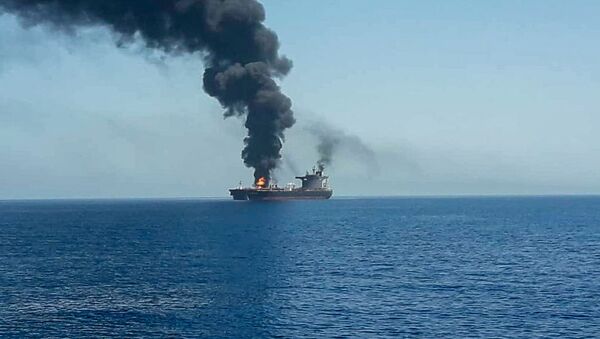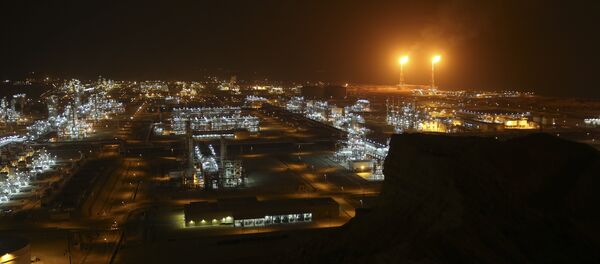“There is obviously a great deal of skepticism [in Iran], because the first attack that was carried out about a month ago on a number of ships near the port off the UAE [United Arab Emirates] coast happened almost immediately after [US National Security Adviser John] Bolton said that he had received intelligence from the Israelis that Iran wants to carry out attacks on US interests,” Marandi told hosts John Kiriakou and Brian Becker.
Bolton previously accused Iran of attacking tankers located off the coast of the Emirati port of Fujairah earlier this month. On May 12, four oil tankers — two Saudi, one Norwegian and one Emirati — were targeted by acts of sabotage in the UAE’s exclusive economic zone in the Gulf of Oman. According to Bolton, the four oil tankers were targeted by “naval mines almost certainly from Iran.”
On Thursday, the “Front Altair” oil tanker, owned by Norwegian company Frontline, and the chemical tanker “Kokuka Courageous,” owned by Japanese company Kokuka Sangyo, were attacked near the Strait of Hormuz, a narrow stretch of water between the Persian Gulf and Gulf of Oman, and one of the most important passageways for world oil supplies.
“Now as the Japanese Prime Minister comes to Iran after 41 years … he is on his way to see the [Iranian Supreme] leader [Ayatollah Ali Khamenei] in the morning, and as he’s getting ready, two ships are hit right outside that are linked to Japan,” Marandi explained. “These attacks seem, again, to be designed to harm Iranian interests, because the Iranian leader, in the meeting with the prime minister, called Japan a friend of Iran. So why would Iran attack targets affiliated or associated with Japan at a time when the prime minister is in Iran? It simply does not make sense.”
On Friday, US President Donald Trump accused Iran of attacking the tankers, claiming that a video released by the US military proves Tehran’s culpability. Just a day prior, US Secretary of State Mike Pompeo claimed that the attacks were executed with such a high degree of sophistication, with all 44 crew members of the tankers being safely evacuated, that Iran was the only power in the region that could have been behind them.
However, on Friday, Yutaka Katada, the president of Kokuka Sangyo, refuted the US version of events, claiming that crew members on the Japanese ship saw a flying object right before the attack.
"I do not think there was a time bomb or an object attached to the side of the ship. A mine doesn’t damage a ship above sea level. We aren’t sure exactly what hit, but it was something flying towards the ship," Katada said, according to Japanese media.
“I’m glad to know that people think that when Iran carries out an attack, they’re very careful not have people killed. I guess that means that they expect the Israelis and Americans to kill innocent people in such attacks,” Marandi told Sputnik.
“But I don't think that is a credible argument. In fact, it runs in contrast to American claims. Americans are claiming that Iranian oil exports are down to zero, which is not true, but if that’s the case, what’s the use in driving up the price of oil?” Marandi asked.
Following the attacks Thursday, oil prices rose by 4% with Brent Crude, the international benchmark for oil prices, spiking to $61.99 a barrel. The US has previously threatened to reduce Iranian crude oil exports "to zero” via sanctions.
“[The rise in oil prices] only benefits the Saudis and the Emiratis. It would make the vast amount of oil that they export more expensive,” Marandi noted.
“The most important point [that one] can make about Iranian responses to the US is a) that the Iranians will restart elements of the nuclear program, and they will decrease their commitment to the [Joint Comprehensive Plan of Action] JCPOA, and that will put pressure on the US and the Europeans; and b) I am very confident that the Iranians are helping the Yemenis in their fight against Saudi and Emirati aggression,” Marandi added. “And the amount of damage that the Yemeni armed forces are doing to the Saudis has gone up dramatically. We have seen how sophisticated the Yemeni defense capabilities have become over the last couple of years, and I think that the transfer of tech to the Yemenis has been from friendly countries like Iran.”
In May 2018, Trump announced the US’ withdrawal from the 2015 Iran nuclear deal, the JCPOA, reinstating harsh sanctions against Tehran. Last month, Iranian President Hassan Rouhani said that Iran would begin stockpiling low-enriched uranium and heavy water, which can be used to build nuclear weapons in nuclear reactors. He also said the country would start enriching uranium to higher levels than permitted under the terms of the JCPOA.








